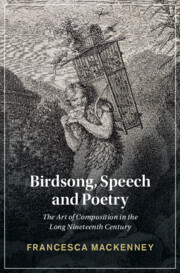Book contents
- Birdsong, Speech and Poetry
- Cambridge Studies In Nineteenth-Century Literature And Culture
- Birdsong, Speech and Poetry
- Copyright page
- Dedication
- Contents
- Figures
- Acknowledgements
- Introduction
- Chapter 1 The Science of Birdsong
- Chapter 2 The Science of Language:
- Chapter 3 ‘Prelusive Notes’
- Chapter 4 ‘Undersong’
- Chapter 5 ‘We Teach ’Em Airs That Way’
- Conclusion
- Notes
- Bibliography
- Index
- Cambridge Studies In Nineteenth-Century Literature And Culture
Conclusion
Published online by Cambridge University Press: 15 September 2022
- Birdsong, Speech and Poetry
- Cambridge Studies In Nineteenth-Century Literature And Culture
- Birdsong, Speech and Poetry
- Copyright page
- Dedication
- Contents
- Figures
- Acknowledgements
- Introduction
- Chapter 1 The Science of Birdsong
- Chapter 2 The Science of Language:
- Chapter 3 ‘Prelusive Notes’
- Chapter 4 ‘Undersong’
- Chapter 5 ‘We Teach ’Em Airs That Way’
- Conclusion
- Notes
- Bibliography
- Index
- Cambridge Studies In Nineteenth-Century Literature And Culture
Summary
When the Humanitarian League wrote to Hardy requesting permission to publish three of his poems (‘The Blinded Bird’, ‘The Puzzled Game-Birds’ and ‘Wagtail and Baby’), the author sent the request swiftly on to Macmillan (Collected Letters, V, p. 240). As its title suggests, Bertram Lloyd’s The Great Kinship: An Anthology of Humanitarian Poetry (1921) is based on a similar principle to that which Hardy expressed in his letter to the League. The expressed intention of Lloyd’s introduction and the poems selected in his anthology is to provide a general history of the representation of animals in Western literature.
- Type
- Chapter
- Information
- Birdsong, Speech and PoetryThe Art of Composition in the Long Nineteenth Century, pp. 180 - 184Publisher: Cambridge University PressPrint publication year: 2022

